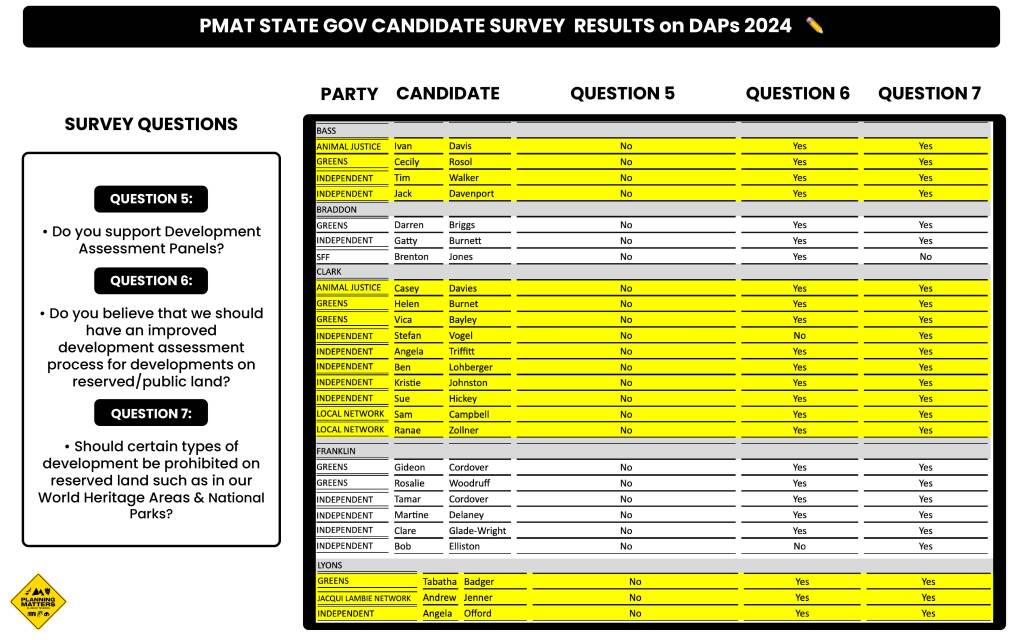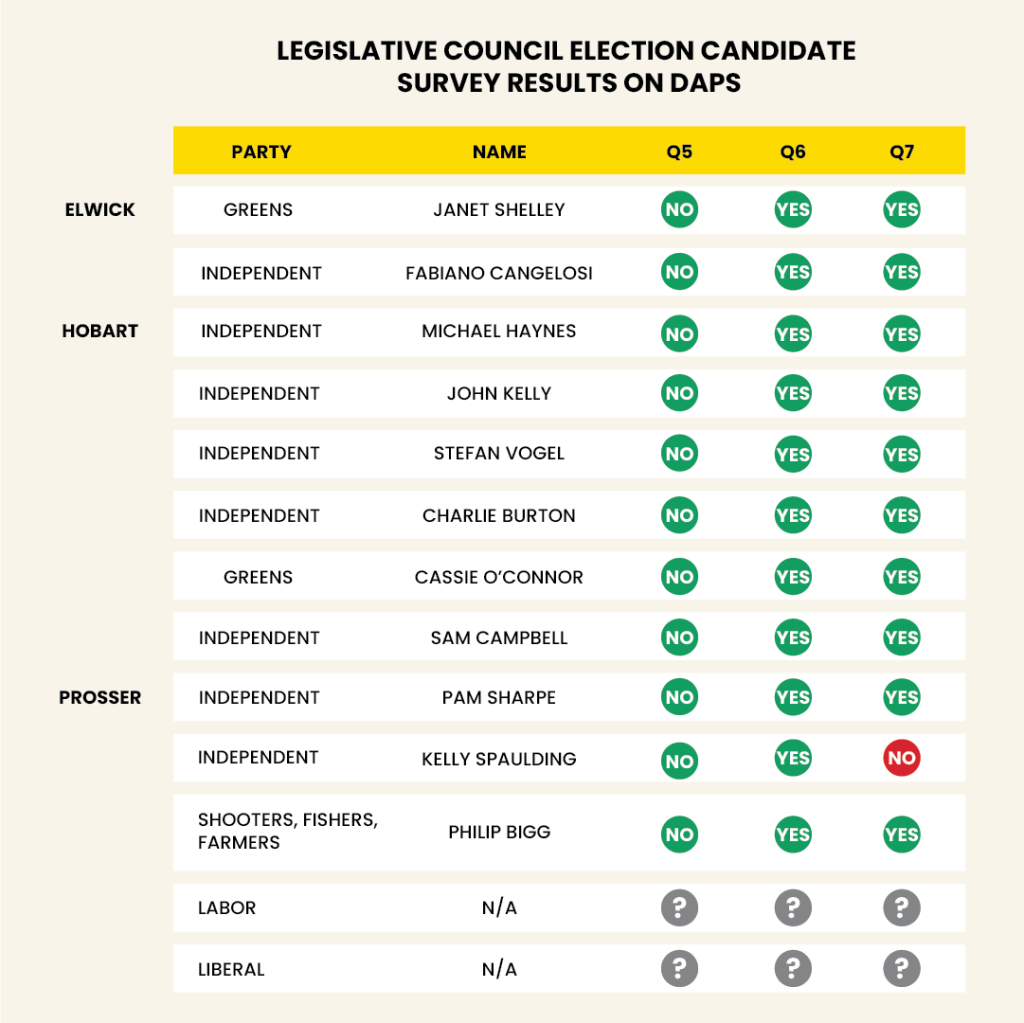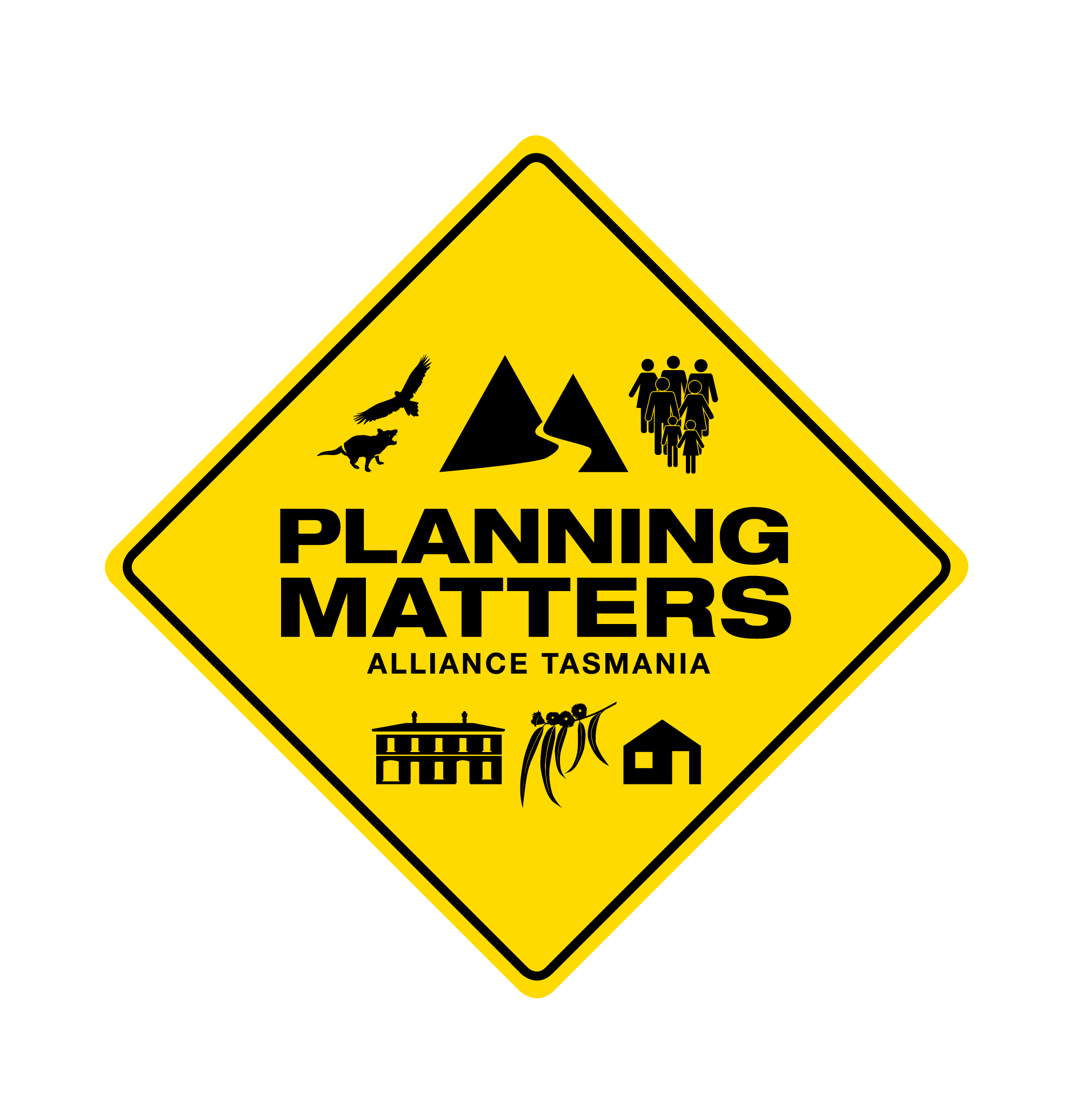Development Assessment Panels
#SCRAPTHEDAP
Summary
Update: Thank you to everyone who made a submission on the Land Use Planning and Approvals (Development Assessment Panels) Bill 2025 which closed on 24 April 2025, your support is greatly appreciated. PMAT will be providing an analysis on the submissions as soon as they’re public. All 29 councils voted to reject the Land Use Planning and Approvals (Development Assessment Panels) Bill 2025 in its current form. The sector still questions the need for the legislation. More information on the Draft DAP Bill here.
Since coming into office, the Tasmanian Liberal Government has changed planning laws dramatically reducing the power of local councils to make decisions about developments across Tasmania via the Tasmanian Planning Scheme and Major Projects legislation. This has weakened the rights of local communities to have a say and to appeal developments that impact their own home and their local streets, towns and local Parks, and their most treasured National Parks and Reserves.
In another step in a long line of anti-democratic measures introduced by the Government, it has proposed further anti-democratic changes to undermine Councils and communities right of say by:
Proposing to introduce Development Assessment Panels (DAPs). The Government has proposed that developments can be taken out of the normal planning process and assessed by DAPs, removing councils from having a say over approvals and removing planning appeal rights and with that, the voice of the community and voters. These changes are proposed for all urban/private land and reserved/public land across Tasmania. Unfortunately, in 2024 the DAP Bill passed the House of Assembly/Lower House with the support of both Liberal and Labor. However, the entire cross bench voted against the Bill. Then, following opposition from every Council in Tasmania the Legislative Council/Upper House voted against the draft DAP legislation. See how your Parliamentarian voted here https://planningmatterstas.org.au/how-did-legislative-council-house-of-assembly-vote-on-daps/. But the Government has said it intends to bring the DAP Bill back in 2025.
Removing/limiting appeal rights. On the 7 February 2025, the Government announced further disturbing major changes to the planning appeals process. The Government’s intention is to almost entirely remove the community’s right to take planning appeals. This legislation will mean appeals can only be lodged by someone who is directly and adversely impacted by the planning decision. The limited appeal rights will apply to individuals and community groups and other organisations will not be able to appeal inappropriate developments across private and public land. However, property developers will maintain their rights to appeal Council decisions across all land tenures.
The Development Assessment Panel Bill was tabled on the 19 November 2024 in the Tasmanian Parliament. The Liberal Government supported by Labor changed the standing orders of the Parliament so they could ram through the DAP Bill, despite it not being tabled for the required length of time. We were deeply disappointed that the DAP Bill passed the Lower House even though every council in Tasmania on the same day voted against the flawed DAP Bill.
To PMAT’s great relief, the DAP Bill was voted down in the Upper House 8-6. See here.
The Bill is available on the Tasmanian Parliamentary website here. The DAP Bill process and the information can be seen here. We anticipate a new bill to be re-tabled in Parliament in 2025.
What's happened to date on DAPs

Nov 2023
PMAT released the first submission guide for the Tasmanian community to make a submission to #SCRAPTHEDAP on the State Govs proposed framework for DAPs on private/urban land.
Submission Results
Through PMAT's submission guide in total 542 submissions were received with 515 (95%) against (clearly against: 15 community organisations, 484 individuals, 11 councils and 5 councils mostly against). Click title to view submission results summary.

January 2024
The State Government proposed DAPs for public/reserved land for our World Heritage Areas, National Parks, Reserves and Crown Land - covering 50.4% of our State.

March 2024
Over four hundred passionate Tasmanians packed Hobart Town Hall for PMAT’s #ScrapTheDAPs public meeting – the largest public event held during the March 2024 State election campaign. Click title link to watch public meeting livestream.

PMAT Surveys State Election Candidates
A State election was held on 23 March 2024 for all House of Assembly seats. Of the 167, 25 candidates completed our survey. Click title link to view full survey results.

DAPs for National Parks
PMAT released a submission guide for DAPs on public/reserved land which helped generate 456 submissions.

PMAT Surveys Legislative Council Candidates
Legislative Council elections were held on 4 May 2024 in the seats of Elwick, Hobart and Prosser. All 16 candidates were surveyed. 11 candidates completed our survey. Click title link to view full survey results.
November 2024
PMAT released their submission guide regarding the draft DAP Bill for DAPs on private/urban land, which included implications for reserved land.

Submission Results
The total number of submissions received on the draft Bill: 482 (461 within consultation period + 21 outside consultation period). 444 of the submissions oppose the creation of DAPs – 92% against.
All 29 Councils Oppose DAPs
On the 21st November 2024 all 29 Councils in Tasmania voted against the flawed DAP Bill.

DAP Bill Passes Lower House
In the last two sitting weeks of Parliament, the Liberal Government, with Labor, changed the standing orders to ram through the DAP Bill, despite it not being tabled for the required length of time. Even though on the same day, every council in Tasmania voted against the flawed DAP Bill. The entire cross bench did however vote against the Bill. Click title link to view full survey results.

DAP Bill Voted DOWN by Upper House
On 29th November 2024, PMAT, the Tasmanian Conservation Trust and the Local Government Association of Tasmania briefed the Legislative Council on why they should vote the DAP Bill down. To great relief, the DAP Bill was voted down eight to six. Click title link to view full survey results.
February 2025
On 26 February 2025, the Planning Minister re-released the contentious and anti-democratic draft DAP Bill despite it being voted down in the Upper House in 2024. Public consultation closed 24 April 2025.
March 2025
PMAT released a submission guide on the Land Use Planning and Approvals (Development Assessment Panels) Bill 2025. Scroll down to see submission guide below.
PMAT Supports
- Retaining assessment and approval of developments within local councils (that is, maintaining councils as a Planning Authority), rather than replacing them with DAPs, ensuring meaningful public participation in the planning process leading to better planning outcomes.
- Elected councillors deciding on development applications. This enhances transparency, independence, accountability, public participation in decision-making within the planning system – all critical elements of a healthy democracy.
- Rather than replacing councils with DAPs, we should be improving council governance and planning processes and providing more resources to local councils. As the Local Government Association of Tasmania says better councils mean better communities.
2025 March PMAT Submission + Guide
Please see below PMAT’s submission regarding the Draft LUPA Amendment (Development Assessment Panels) Bill 2025 which outlines our key concerns with the second iteration of the draft Bill. PMAT recommended the Bill be scrapped in its entirety.
Public comment was invited between the 26 February and 24 April 2025.
PMAT released a community submission guide to help comment on the Draft LUPA Amendment (Development Assessment Panels) Bill 2025 .
2024 Nov PMAT Submission + Guide
Please see below PMAT’s submission regarding the Draft LUPA Amendment (Development Assessment Panels) Bill 2024 which outlines our key concerns with the draft Bill. PMAT recommended the Bill be scrapped in its entirety.
Public comment was invited between the 7 October and 12 November 2024.
PMAT released a community submission guide to help comment on the Draft LUPA Amendment (Development Assessment Panels) Bill 2024 .
2024 Nov Submission Results

2024 April PMAT Submission + Guide
Please see below PMAT’s submission regarding:
1. Consultation Paper: National Parks and Reserves Management Act 2002 – Reserve Activity Assessment Process Reform – Statutory Environmental Impact Assessment Process which proposes a new fast-track development assessment process for large or controversial projects on public reserved land. ‘Independent’ Assessment Panels (roughly equivalent to the proposed Development Assessment Panels for urban/private land) formed by the Tasmanian Planning Commission will assess developments in our National Parks and Reserves and Crown Land.
2. The supplementary Information Sheet: Proposed Management Planning Processes proposes major changes to how Reserve Management Plans are prepared and amended. A Management Plan for a National Park or other Reserve is a document prescribed in legislation that sets out the “rules” which determine what activities and developments can occur within a park, analogous to the role of a planning scheme in Local Government.
PMAT raised many concerns about what the Tasmanian Government is proposing with regards to development assessment and management of reserved and Crown land. PMAT made many recommendations including that at minimum, the Reserve Activity Assessment process must guarantee merits-based planning appeal rights for any significant development proposed on reserved and/or crown land. The community’s voice must not be removed from having proper say on developments on public land.
Public comment was invited between 11 January – 29 March 2024.
PMAT released a community submission guide to help comment on DAPs on public/reserved land, including our World Heritage Areas, National Parks, Reserves and Crown Land – covering 50.4% of our State.
2024 April Submission Results
PMAT helped generate 456 submissions for DAPs on public/reserved land like our World Heritage Areas, National Parks, Reserves and Crown Land.
During this period, over four hundred passionate Tasmanians packed Hobart Town Hall for PMAT’s #ScrapTheDAPs public meeting – the largest public event held during the March 2024 State election campaign.
2023 PMAT Submission + Guide
Please see below PMAT’s submission regarding the Tasmanian Governments Position Paper on a proposed Development Assessment Panel Framework.
PMAT recommends abandoning the planning panels and instead take action to improve governance and the existing Council planning process by providing more resources to councils and enhancing community participation and planning outcomes.
Public comment was invited between the 19 October and 30 November 2023.
PMAT released a community submission guide to help comment on the Position Paper on a proposed Development Assessment Panel Framework which closed on the 30 November 2023.
2023 Submission Results
Through PMAT’s submission guide on the Position Paper on a proposed Development Assessment Panel Framework, 542 submissions were received with 515 (95%) against (clearly against: 15 community organisations, 484 individuals, 11 councils and 5 councils mostly against).
PMAT's Key Concerns
We oppose the creation of Development Assessment Panels (DAPs) and increasing ministerial power over the planning system, for the following reasons:
- It will create an alternate planning approval pathway allowing property developers to bypass local councils and communities. Handpicked state appointed planning panels, conducted by the Tasmanian Planning Commission, will decide on development applications not your elected local council representatives. Local concerns will be ignored in favour of developers who may not be from Tasmania. Also, if an assessment isn’t going their way the developer can abandon the standard local council process at anytime and have a development assessed by a planning panel. This could intimidate councils into conceding to developers demands.
- The Tasmanian Planning Commission is not independent – DAPs are hand-picked, without detailed selection criteria and objective processes, are inconsistent with the principles of open justice as they do not hold public hearings, and lack capacity to manage conflicts of interest (as per the 2020 Independent Review). DAPs do not have to provide written reasons for their decision (making it difficult to seek judicial review). Community input will be less effective because it will be delayed until after the DAP has consulted (behind closed doors) with the developer and any relevant government agencies, and adopted its draft decision.
- Research demonstrates DAPs are pro-development and pro-government, they rarely deeply engage with local communities, and they spend most of their time on smaller applications and take longer than local councils to make decisions.
- Makes it easier to approve large scale contentious developments like the kunanyi/Mount Wellington cable car, high-rise in Hobart, Cambria Green and high-density subdivision like Skylands at Droughty Point and the UTAS Sandy Bay campus re-development.
- Removes merit-based planning appeal rights via the planning tribunal on all the issues the community cares about like impacts on biodiversity, height, bulk, scale or appearance of buildings; impacts to streetscapes, and adjoining properties including privacy and overlooking; traffic, noise, smell, light and so much more. TASCAT review of government decisions is an essential part of the rule of law and a democratic system of government based on ‘checks and balances’.
- Removing merits-based planning appeals removes the opportunity for mediation on development applications in the planning tribunal.
- Developments will only be appealable to the Supreme Court based on a point of law or process which have a narrow focus and are prohibitively expensive.
- Removing merits-based planning appeals has the potential to increase corruption, reduce good planning outcomes, favour developers and undermine democracy. The NSW Independent Commission Against Corruption recommended the expansion of merit-based planning appeals as a deterrent to corruption. Mainland experience demonstrates planning panels favour developers and undermine democratic accountability. Local planning panels, which are often dominated by members of the development sector, were created in NSW to stamp out corruption, but councillors from across the political spectrum say they favour developers and undermine democratic accountability. Mainland research demonstrates removing merits-based planning appeals has the potential to reduce good planning outcomes – including both environmental and social.
- Increased ministerial power over the planning system increases the politicisation of planning and risk of corrupt decisions. The Planning Minister will decide if a development application meets the DAP criteria. The Minister will be able to force the initiation of planning scheme changes, but perversely, only when a local council has rejected such an application, threatening transparency and strategic planning.
- Flawed planning panel criteria. Changing an approval process where the criteria is on the basis of ‘perceived conflict of interest’, ‘a real or perceived bias’, ‘the application relates to a development that may be considered significant’ and the ‘development is likely to be controversial’ is fraught. The Planning Minister has political bias and can use this subjective criteria to intervene on any development in favour of developers. NOTE: The scope of the DAPs includes a range of subjective factors that are not guided by any clear criteria:
–Valuations of $10 million in cities and $5 million in other areas.
–A determination by Homes Tasmania that an application includes social or affordable housing. There is no requirement for a proportion of the development to be for social or affordable housing. For example, it could be one house out of 200 that is affordable. - Poor justification – there is no problem to fix. Only about 1% of council planning decisions go to appeal and Tasmania’s planning system is already among the fastest in Australia when it comes to determining development applications. The Government wants to falsely blame the planning system for stopping housing developments to cover its lack of performance in addressing the affordable housing shortage.
- Increases complexity in an already complex planning system. Why would we further increase an already complex planning system which is already making decisions quicker than any other jurisdiction in Australia?





Further Information
Listen/Watch PMAT’s #ScrapTheDAP 400+ strong Town Hall 2024 public meeting
John Dowson – President, Fremantle Society, former Deputy Mayor and Councillor, City of Fremantle, WA. Why DAPs have failed in WA. Dr Phillipa McCormack – Adjunct Lecturer in Law, University of Tasmania & researcher with the University of Adelaide with expertise in environmental regulation & administrative law. Alice Hardinge – Tasmanian Campaigns Manager, Wilderness Society Tasmania. Anja Hilkemeijer – Lecturer in law at the University of Tasmania, with a focus on foundations of public law, constitutional law and human rights law. Mayor Reynolds – Lord Mayor & Councillor, Hobart City Council.
Key Documents:
- Report on Consultation – DAP Framework Position Paper.
- Development Assessment Panel (DAP) Fact Sheet.
- The draft Land Use Planning and Approvals Amendment (Development Assessment Panels) Bill 2024 and General Bill process.
Independent Commission Against Corruption (ICAC)
ICAC Report – Anti-Corruption Safeguards & the NSW Planning System
DAPs failing on mainland Australia
NSW: Local planning panels were created to stamp out corruption, but councillors from across the political spectrum (including Philip Ruddock) say they favour developers and undermine democratic accountability: How ‘unelected faceless men and women’ keep approving NSW developments, Sydney Morning Herald, August 15, 2021.
NSW: EDO NSW Report Merits Review in Planning in NSW: Mainland research demonstrates removing merits-based planning appeals has the potential to reduce good planning outcomes – including both environmental and social.
WA: JDAP Ignores 220 Submissions, Fremantle Herald, October 2023.
How did the Legislative Council + House of Assembly vote on DAPs?





Related News & Media

DAP Survey Results: Legislative Election Candidates Position on DAPs 2025
Legislative Council (Upper House of Tasmanian Parliament) elections are being held on 24 May 2025 in the seats of Montgomery,

PMAT Media Release: The Tasmanian Government’s renewed push for DAPs is another demonstration they don’t care about the community
The Tasmanian Government’s renewed push for DAPs is another demonstration they don’t care about the community or Local Government,” says

The Mercury: Some Disturbing Developments for Democracy
“Underpinning the DAP [Development Assessment Panel] proposal and the curtailment of appeal rights is the undermining of democracy. And there

The Mercury: DAPs ‘undemocratic’
Planning legislation critics say new bill is very similar to last year’s failed attempt. Written by David Killick in The

Support Us
Receive News & Updates from PMAT
Stay informed on what’s happening locally and statewide within Tasmania, and join our community in advocating to protect Tasmania’s future.